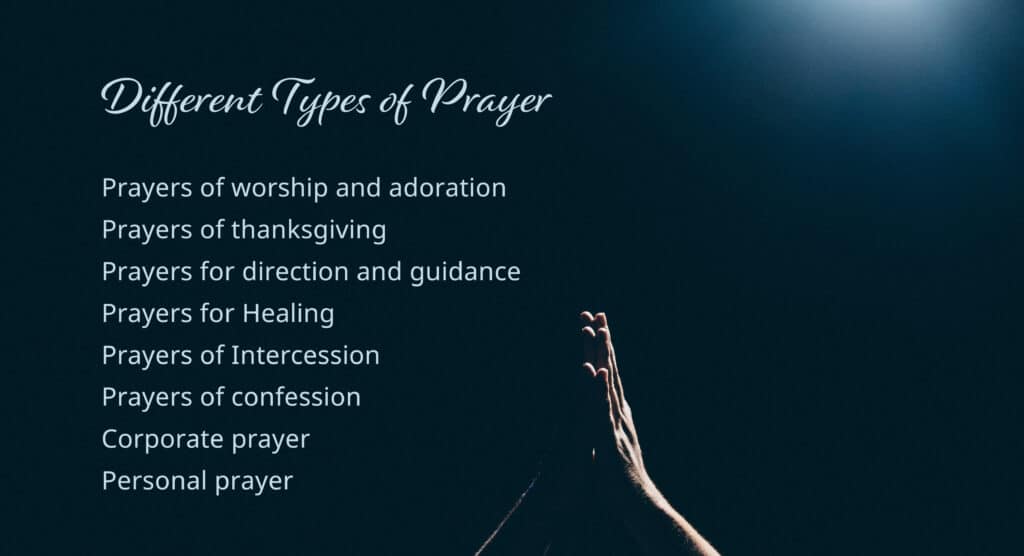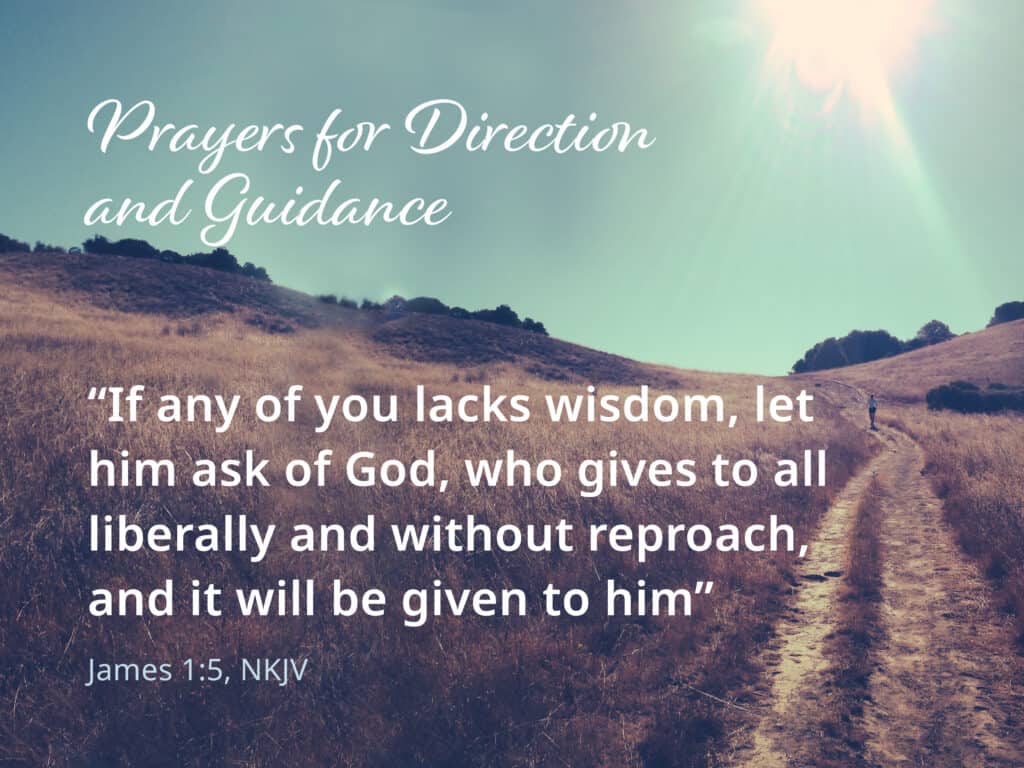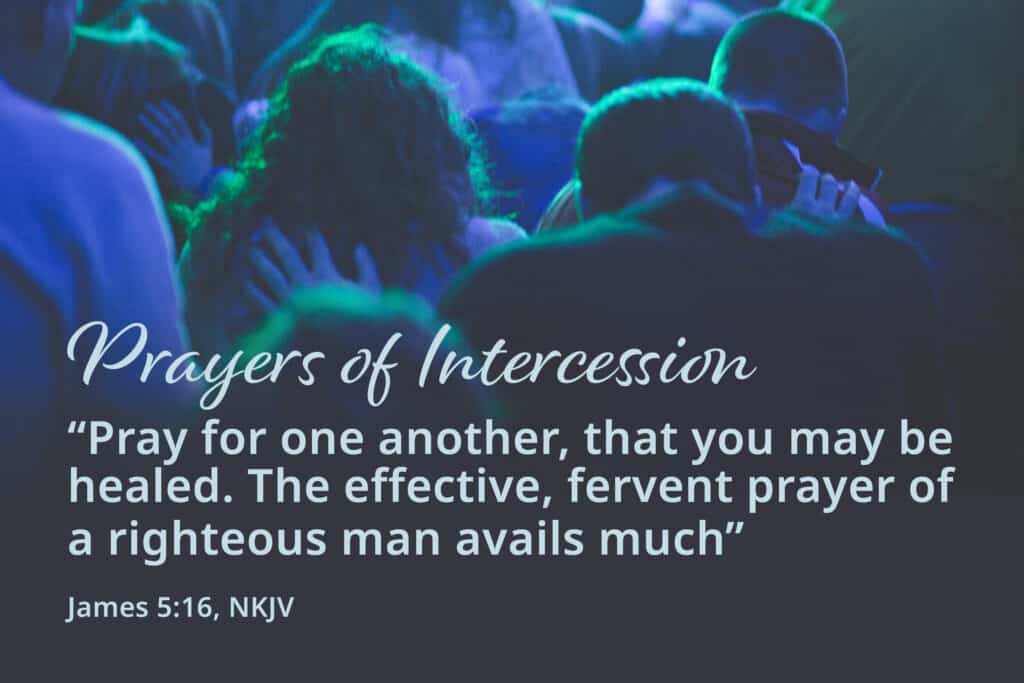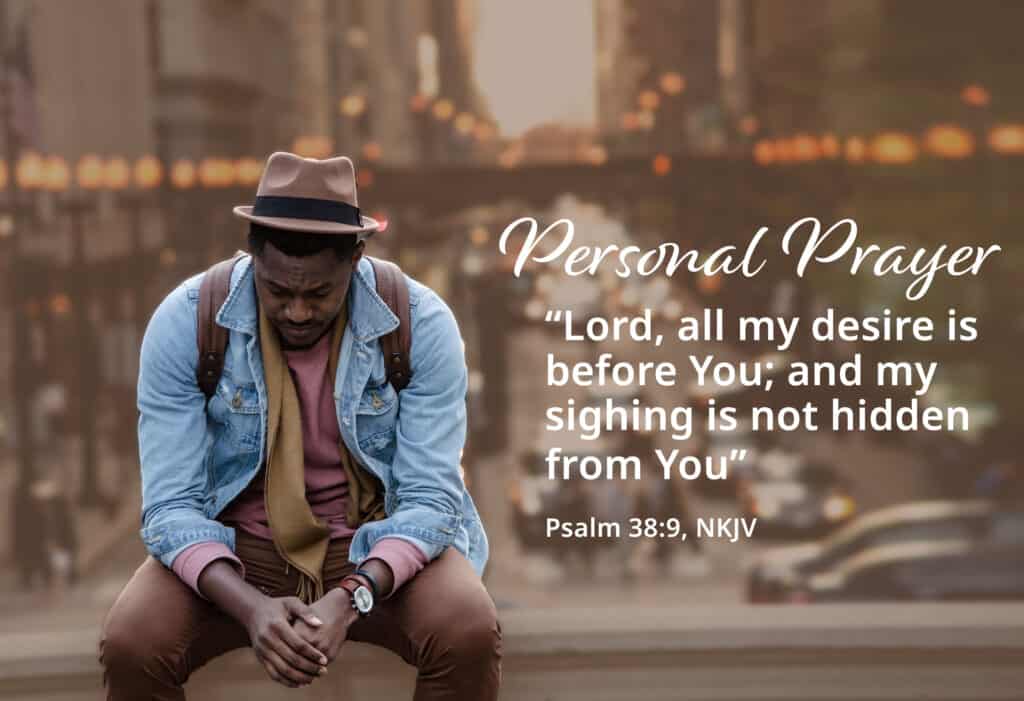The Bible gives us several examples of different types of prayers to God. They vary in purpose and context, and learning about them can deepen our own prayer lives.
So what are these different types of prayer, and how do we know what type to use in what situations?

Here we will cover these common ways people communicated with God:
- Prayers of worship and adoration
- Prayers of thanksgiving
- Prayers for direction and guidance
- Prayers for healing
- Prayers of intercession
- Prayers of confession
- Corporate prayer
- Personal prayer
But as we go through these, remember that the exciting thing about all types of prayer is that you are talking to the God of the universe.
You are invited to commune with the Divine. God says, “pray to Me, and I will listen to you” (Jeremiah 29:12, NKJV).
Prayers of worship and adoration
Prayers of worship acknowledge God’s glory, goodness, love, and power. They give us a chance to recognize how beautiful, creative, and loving He is, expressing these sentiments through the lens of our own experiences.
David, the Psalmist, often expressed worshipful prayers:
O Lord, our Lord,
Psalm 8:1 (ESV)
How majestic is your name in all the earth!
Make a joyful shout to God, all the earth!
Psalm 66:1-3 (NKJV)
Sing out the honor of His name;
Make His praise glorious.
Say to God, How awesome are Your works!
Even Job, after experiencing all kinds of loss, expressed adoration for the Almighty:
I know that you can do all things,
Job 42:2, 3 (ESV)
And that no purpose of yours can be thwarted. …
‘Who is this that hides counsel without knowledge?’
Therefore I have uttered what I did not understand,
Things too wonderful for me, which I did not know.
Prayers of worship can sometimes be songs or poems. Whenever we address God with the intention of focusing on His glory, it is a form of adoring prayer.
This is different than a simple thank-you prayer. These prayers focus on who God is, rather than on something He’s done.
Yours, O Lord, is the greatness and the power and the glory and the victory and the majesty, for all that is in the heavens and in the earth is yours.
1 Chronicles 29:10-13 (ESV)
Yours is the kingdom, O Lord, and you are exalted as head above all. Both riches and honor come from you, and you rule over all. In your hand are power and might, and in your hand it is to make great and to give strength to all.
Adoration prayers often go hand in hand with meditation, when we look through Scripture and intentionally devote our thoughts to the qualities of God. It helps us realize just Who it is we’re communing with. And it can do wonders for developing faith.
Sometimes prayers of worship happen within a group, like at a church service or small group.
Sometimes we might pray in worship to God when we’re alone, away from distractions, focusing on Him.
Prayers of thanksgiving
As we recognize the blessings of God, it’s good to express our gratitude. It helps us recognize the good in our lives, and it helps us attribute these things to the One all good things come from (James 1:17).
The children of Israel had an amazing testimony of praise. God opened the Red Sea so they could escape certain death. The pursuing Egyptians were washed away. And on the other side of the Sea, the newly-freed Israelites joined together to praise God.
I will sing to the Lord, for He has triumphed gloriously!
Exodus 15:1, 2 (NKJV)
The horse and its rider He has thrown into the sea!
The Lord is my strength and song, and He has become my salvation;
He is my God, and I will praise Him.
When God helped Daniel interpret King Nebuchadnezzar’s dream, He made sure that all the glory went to Him:
To you, O God of my fathers,
Daniel 2:23 (ESV)
I give thanks and praise,
For You have given me wisdom and might,
And have not made known to me what we asked of You,
For You have made known to us the king’s matter.
It’s an excellent habit to work on—looking at everything that happens in our lives with gratefulness. Numerous books have been written about living a grateful life. We may find that as we continue to thank God for the many ways He blesses us, big and small, our faith and our attitudes improve.
But what about when we’re struggling, and we don’t know what to do next? What about those dark times when giving thanks feels impossible? This next type of prayer can be the first step.
Prayers for Direction and Guidance
God promises to guide us are all over the Bible. And we can claim them in our prayers to Him.
In Isaiah, God promises to give us direction:
Your ears shall hear a word behind you, saying, ‘This is the way, walk in it,’ whenever you turn to the right hand or whenever you turn to the left.
Isaiah 30:21 (NKJV)
As we pray for guidance, we open our minds to receive God’s directions.
Gideon was an Old Testament judge of Israel who prayed for God’s guidance. God had asked him to fight Israel’s enemies. But he wanted to make sure it was truly God he was hearing, and that He was indeed promising victory for Israel.
So he asked God for a sign, and he put a piece of wool on the ground.
If You will save Israel by my hand as You have said—look, I shall put a fleece of wool on the threshing floor; if there is dew on the fleece only, and it is dry on all the ground, then I shall know that You will save Israel by my hand, as You have said.
Judges 6:36-37 (NKJV)
In the morning, when Gideon checked the wool. It was wet, and the ground around it was dry (Judges 6:38, NKJV).
Gideon was impressed, but still wanted to be absolutely sure.
Do not be angry with me, but let me speak just once more: let me test, I pray, just once more with the fleece; let it now be dry only on the fleece, but on all the ground let there be dew
Judges 6:39 (NKJV)
Again, God provided Him with a sign.
God did so that night. It was dry on the fleece only, but there was dew on all the ground
Judges 6:40 (NKJV)
Gideon’s story shows us how willing God is to provide guidance and even help us get to the point of faith. He wants to guide us.
So don’t be afraid to ask God for specific directions. We are encouraged to open our minds to receive His guidance.
The book of James counsels, “If any of you lacks wisdom, let him ask of God, who gives to all liberally and without reproach, and it will be given to him” (James 1:5, NKJV).

Want to learn even more about prayer? The Bible has hundreds of examples of humanity conversing with God. Start your own Bible study!
Prayers for healing
James has even more to say about prayer. In his epistle, he gives specific steps to pray for healing.
Is anyone among you sick? Let him call for the elders of the church, and let them pray over him, anointing him with oil in the name of the Lord. And the prayer of faith will save the sick, and the Lord will raise him up.
James 5:14, 15 (NKJV)
When we are suffering, God lets us know we can rely on the community of faith. By expressing our needs and asking for prayer, we involve others in God’s work in our life.
Prayers for healing can also include anointing. Anointing with oil happens during a time of prayer. An elder or minister drops a small amount of oil on the head while saying a special prayer for healing.
When Jesus sent His disciples into the community, they anointed the sick. Mark writes that they “anointed with oil many who were sick, and healed them” (Mark 6:13, NKJV).
While we can’t always know if the outcome will be what we hope, we can still trust that God is with us, walking us through it. The Apostle Paul is an example of this. He had a “thorn in the flesh” (2 Corinthians 12:7, NKJV). Something had been bothering him for some time, though he doesn’t say what it is. But it’s clear how much it was affecting him. So he asked God for healing.
Concerning this thing I pleaded with the Lord three times that it might depart from me.
2 Corinthians 12:8 (NKJV)
After praying three times, Paul received an answer.
And He said to me, ‘My grace is sufficient for you, for My strength is made perfect in weakness.
2 Corinthians 12:9 (NKJV)
But was Paul bitter? Did it make him doubt God?
Therefore most gladly I will rather boast in my infirmities, that the power of Christ may rest upon me. Therefore I take pleasure in infirmities, in reproaches, in needs, in persecutions, in distresses, for Christ’s sake. For when I am weak, then I am strong.
2 Corinthians 12:9, 10 (NKJV)
Knowing God loves us, we can be at peace. Whatever happens to us physically, we can trust that God knows best. God’s goal is to save us for eternity. The disciple John writes, “This is the confidence that we have in Him, that if we ask anything according to His will, He hears us” (1 John 5:14, NKJV).
What about prayers for other people? When we see someone who is in desperate need, how can we pray for them? This brings us to our next type of prayer: intercessory prayer.
Prayers of intercession
Intercessory prayer holds up the needs of others to God. We may be the only person praying for someone. They may not even be praying for themselves. They may not even realize their need.
We can make a difference in the lives of other people by praying for them:
Pray for one another, that you may be healed. The effective, fervent prayer of a righteous man avails much.
James 5:16 (NKJV)

God invites us to pray for those close to us. He promises, “I will contend with him who contends with you, and I will save your children” (Isaiah 49:25, NKJV).
Right before Jesus died, His beloved disciple Peter denied that he knew Him (Luke 22:54-60, NKJV). And Jesus even predicted this.
Before this happened, Peter even promised Jesus that he wouldn’t deny him. But he did. Three times. Mostly likely out of fear since he was approached abruptly, he distanced Himself from Jesus, saying that he didn’t know Him.
“I have prayed for you,” Jesus told him, “that your faith should not fail; and when you have returned to Me, strengthen your brethren” (Luke 22:32, NKJV).
It was this prayer that sustained Peter after he denied Christ.
And right before Jesus was to go to the Cross, He prayed a long, profound prayer of intercession for His followers.
I do not ask that you take them out of the world, but that you keep them from the evil one. … Sanctify them in the truth; your word is truth. As you sent me into the world, so I have sent them into the world. And for their sake I consecrate myself, that they also may be sanctified in truth.
John 17:15-19 (ESV)
It is also important to pray for our communities, and even our countries and leaders. In 1 Timothy 2:1, 2 we’re encouraged to intercede “for all people,” and specifically “for kings and all who are in high positions.”
Intercessory prayer is a way we can touch the lives of others with God’s helping hand.
But what about when we’re struggling with our mistakes? What if we’re in the middle of a mess we’re responsible for? Is there a prayer that says, “I’m sorry”?
Prayers of confession
Since God knows everything, is it necessary to confess our mistakes to Him?
God wants us to confess not for His benefit, but for ours. God is happy to forgive us (Acts 5:31, NKJV), but we have to ask Him. Our part is to acknowledge our sins and ask Him to forgive us. And that’s how we begin to grow past our struggles.
Remember the story of King David and Bathsheba (2 Samuel 11)? Bathsheba was a married woman. David abused his royalty to summon her away from her home to come to him, all while her husband was away at war. Long story short, she got pregnant, and David orchestrated a way for her husband, Uriah, to die in battle. Then he made Bathsheba one of his wives.
There’s no way around it—that’s an awful, detestable thing for him to have done.
After the prophet Nathan confronted David about this affair, that’s when it all hit him. The guilt overcame him and he was ashamed of what he’d done.
He made a complete confession to God. His heart was filled with repentance. He begged God for forgiveness, knowing full well he didn’t deserve it. But he longed to experience the restoration that only can come from God.
In Psalms 51:1-3, 7 (NKJV) we find the details of his confession:
Have mercy upon me, O God,
According to Your lovingkindness;
According to the multitude of Your tender mercies,
Blot out my transgressions.
Wash me thoroughly from my iniquity,
And cleanse me from my sin.
For I acknowledge my transgressions,
And my sin is always before me.
Create in me a clean heart, O God,
And renew a steadfast spirit within me.
God gave David the gift of forgiveness and honored his prayer of confession.
Prayers of confession don’t have to be elaborate. A good place to start can be as simple as “God, I’m sorry. Please forgive me.”
What if we feel unforgivable? What if we’re sure we’ve gone too far?
Don’t be discouraged. Nothing is too hard for God. “With God all things are possible,” (Matthew 19:26, NKJV).
The Bible tells us, “There is joy in the presence of the angels of God over one sinner who repents” (Luke 15:10, NKJV).
All heaven gets excited when we ask for forgiveness because that means we are not lost. We want to come back. Our restoration to God is a joyful occasion.
We don’t have to confess for forgiveness through a pastor or a priest. God’s ear is open to our request. The Bible says, “If we confess our sins, He is faithful and just to forgive us our sins and to cleanse us from all unrighteousness” (1 John 1:9, NKJV).
When we pray a prayer of confession, we can claim the gift of forgiveness. God forgives our mistakes and gives us a new chance.
Prayers of confession are often made in secret. Next we’ll explore public prayer.
Corporate prayer
Public or corporate prayer is when a large group joins together to commune with the Lord. It is a time to unite in bringing our requests and cares before God. God’s Word tells us “where two or three are gathered together in My name, I am there in the midst of them” (Matthew 18:20, NKJV).
Praying together is an important experience. Group prayer binds human hearts together and deepens our shared relationship with God.
In the early Christian church, group prayer happened daily.
All these with one accord were devoting themselves to prayer, together with the women and Mary the mother of Jesus, and His brothers.
Acts 1:14 (ESV)
And they devoted themselves to the apostles’ teaching and the fellowship, to the breaking of bread and the prayers.
Acts 2:42 (ESV)
The story of Peter in prison is an amazing example of the power of group prayer.
Peter, a leader of the early church, was imprisoned because he was preaching about Jesus. As he awaited execution, his church family gathered together and prayed. Acts 12:5 tells us, “Constant prayer was offered to God for him by the church.”
The night before his scheduled execution, an angel appeared in his prison cell. Unseen by the guards that were standing on either side of him, the angel called to Peter. “Arise quickly!” he said (Acts 12:7, NKJV).
Peter’s chains fell off, and he followed the angel through the prison gates. Once they were on the street the Bible tells us that “immediately the angel departed from him” (Acts 12:10, NKJV).
Peter walked to the home of a friend. The Bible tells us that at this home “many were gathered together praying” (Acts 12:7, NKJV). Peter knocked on the door, and a young girl answered. When she heard Peter’s voice, she ran back to tell everyone that Peter was outside.
“You are beside yourself!” (Acts 12:15, NKJV), the others said.
As they were trying to make sense of what she said, they heard knocking on the door. “Peter continued knocking; and when they opened the door and saw him, they were astonished” (Acts 12:16, NKJV). God had answered their prayers!
Paul tells us that God is “able to do exceedingly abundantly above all that we ask or think” (Ephesians 3:20, NKJV). He delights to answer prayers. When people gather together to pray, His ear is open to our voices. His heart is ready to pour out blessings upon us.
In his book, Peter tells us, “The eyes of the Lord are on the righteous, and His ears are open to their prayers” (1 Peter 3:12, NKJV).
What about when we’re alone? When we have secrets we can’t share with anyone? Will God listen to our fears? Our cares? Our dreams? Let’s find out more about one-on-one prayer.
Personal prayer

Personal prayer is the most intimate type of prayer. Because it’s just us and God, we can be bold. We can tell God everything we’re feeling.
It can still feel difficult to do this sometimes, just because we don’t even like to think about some of the things we need to pray about. But He is a safe place to unburden our darkest secrets. In many ways, He is the only “place” we can do this.
Lord, all my desire is before You; and my sighing is not hidden from You.
Psalm 38:9 (NKJV)
So when should we have personal prayer?
Well, there’s never a bad time! But it can be especially beneficial to start our day with prayer.
My voice You shall hear in the morning, O Lord; in the morning I will direct it to You, and I will look up.
Psalm 5:3 (NKJV)
When Jesus was on earth, He would spend entire nights in prayer talking to His Father in heaven. The Bible says, “He went out to the mountain to pray, and continued all night in prayer to God” (Luke 6:12, NKJV).
God is our heavenly Father. He loves it when we talk to Him and tell Him what we’re feeling. He loves spending time with each of His children and is always interested in what we have to share.
Personal prayer helps our hearts to grow, and to be more alert to God’s guidance. And by confiding in Him, we deepen our relationship with Him.
By seeing our prayers answered, we learn to trust Him.
By asking for His help and guidance, we become more like Him.
The Bible tells us, “Seek the Lord and His strength; Seek His face evermore!” (1 Chronicles 16:11, NKJV).
Just pray. That’s all you need to do!

There is a type of prayer that is best suited for every circumstance of life.
Do we feel like we’re on top of the world? We can praise God with our friends through prayers of worship, or prayers of thanksgiving.
Do we have a burden we can’t tell anyone? We can pour out our souls to Him in private prayer.
Are we suffering from sickness or injury? We can mobilize the power of group prayer as we call for the elders to anoint us and pray for us.
Prayer is a powerful tool. With it, we can become in harmony with God Himself. Humanity can touch divinity, and we can change for the better.
God tells us, “Call upon Me in the day of trouble; I will deliver you, and you shall glorify Me” (Psalm 50:15, NKJV).
But overall, there is never a wrong time or a wrong way to reach out to God. Any time our thoughts are directed toward God, He hears us.
Requests, praises, pleadings, confession—all are welcome at God’s throne.
Want to find out more about the powerful God we pray to? Start your own online Bible study.